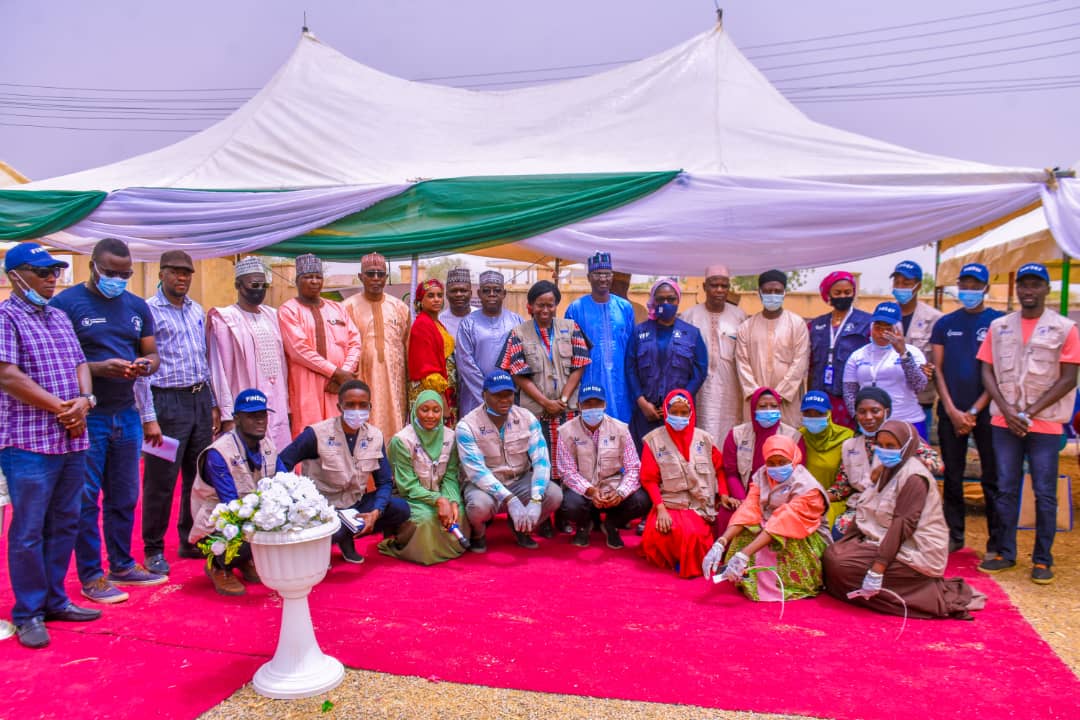By Chimezie Godfrey
The United Nations World Food Programme (WFP) received the sum of US$1 million in 2021 from the Government of Nigeria as part of an ECOWAS humanitarian assistance to the Nigerian Government for victims of violent conflicts in North West and North East Nigeria.
The fund from ECOWAS was granted to the government of Nigeria from the ECOWAS Regional Stabilization Fund.
The Government of Nigeria accordingly sought the collaboration of WFP in Nigeria to apply the fund for alleviating food and nutrition needs in Katsina, Zamfara and Borno states.
The programme targeted 840 food insecure households (some 4,196 persons) in Zamfara, Katsina and Borno states with food assistance.
The target beneficiaries receive an average cash transfer of NGN 27,000 in their prepaid bank cards or WFP SCOPE cards every month to buy their preferred food from local markets.
Beneficiaries are encouraged to buy a wide range of local nutritious foods from their preferred shops. Cash transfers have an additional advantage of stimulating local markets and agricultural production.
To prevent acute malnutrition in children in the first 1,000 days of their lives, the programme also provides nutrition assistance to children 6-23 months old and to pregnant and breastfeeding women from vulnerable and food insecure households.
Some 14,070 children and 1,932 pregnant/breastfeeding women receive specialized nutritious food in the three (3) project states.
In addition to providing life-saving food and nutrition assistance to vulnerable families, WFP is also using the ECOWAS donation to build the resilience of the households in the conflict-affected states of Borno, Adamawa, Yobe and Katsina.
The project will provide milling machines and training support to 603 returnees from Cameroon and displaced rural women to support them in generating some income to sustain their livelihoods.
Sadiya Farouq, Minister of Humanitarian Affairs, Disaster Management and Social Development stated that this project has provided the FMHADMSD the unique opportunity of showcasing best practices of partnership and collaboration in delivering humanitarian intervention.
She stated,”It has equally advanced the efforts of the Nigerian Government in touching the lives of a critical mass of Nigerians in vulnerable situations.”
Dr. Siga Fatima Jagne, Commissioner for Social Affairs and Gender, ECOWAS Commission stated,“In line with the humanitarian mandate of the ECOWAS Commission and in response to the Decision of the Fiftieth Ordinary Session of the Authority of Heads of State and Government of December 17, 2016, to assist population in North East Nigeria affected by terrorism, the ECOWAS Commission in strong collaboration with the Government of Nigeria and the World Food Programme is providing humanitarian support to our populations in need in Nigeria and will continue to build the resilience of our people to bridge the humanitarian-development nexus across the West African region for a prosperous ECOWAS Community.
The WFP Representative and Country Director, Ronald Sibanda noted that the Government of Nigeria’s contribution, through ECOWAS, came at a very critical point as conflict and impact of climate change continue to drive hunger in the country.
“In these affected states, persistent conflict, climate shocks, high food prices and reduced household purchasing power undermine people’s ability to feed themselves.
“WFP welcomes this contribution which underpins efforts to continue providing life-saving food and nutrition support and livelihoods assistance to those most in need in the conflict-affected states”.
The Federal Ministry of Humanitarian Affairs, Disaster Management and Social Development was created by the Federal Government of Nigeria to provide a sustained response to the humanitarian crisis in Nigeria and to institutionalize all governments efforts towards social inclusion and response to disasters and humanitarian crisis while providing the much-needed coordination of Humanitarian interventions.
The Ministry in line with its mandate develops humanitarian policies and provides effective coordination of National and International humanitarian interventions; while ensuring strategic disaster mitigation, preparedness and response.
It continues to successfully implement the National Social Investment Programme (NSIP) where over thirty million Nigerians have benefited and continue to benefit directly and indirectly from different components of the programme making it the largest social protection programme ever carried out in Nigeria and one of the biggest in Africa.
The Economic Community of West African States (ECOWAS) established on May 28 1975 via the treaty of Lagos. ECOWAS is a 15-member regional group with a mandate of promoting economic integration in all fields of activity of the constituting countries.
Member countries making up ECOWAS are Benin, Burkina Faso, Cape Verde, Cote d’ Ivoire, The Gambia, Ghana, Guinea, Guinea Bissau, Liberia, Mali, Niger, Nigeria, Sierra Leone, Senegal and Togo.
Considered one of the pillars of the African Economic Community, ECOWAS was set up to foster the ideal of collective self-sufficiency for its Member States.
The United Nations World Food Programme is the world’s largest humanitarian organization, saving lives in emergencies and using food assistance to build a pathway to peace, stability and prosperity for people recovering from conflict, disasters, and the impact of climate change.




